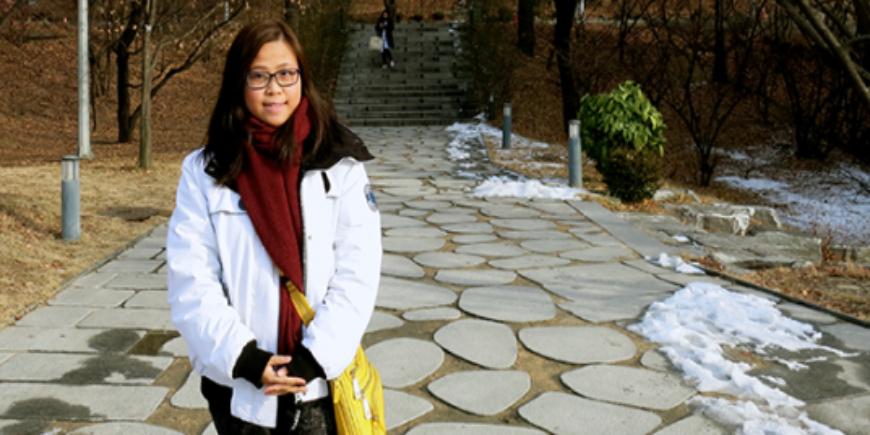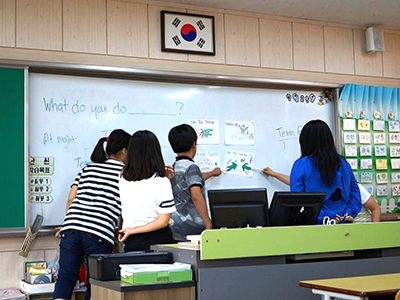
It was intimidating to take the step of traveling alone when I had always lived comfortably in a safe and familiar environment. At the same time, however, the thought of going on an adventure, meeting new people, and learning new skills was too exciting to ignore! Doing an international Co-op gave me the opportunity not only to see the world, but also to gain valuable work-related experience and tackle new challenges. I am so glad that I took the opportunity to travel to South Korea and teach English. I’ve met amazing people from around the world and I am constantly learning interesting facts about different cultures. There is so much to see and experience here in Korea, and the people here are just as interested in our own Canadian/Western culture.

However, even with all the positives of living abroad, it is not always easy to live in a country where English is not an official language. In the area I was placed in, most individuals do not have opportunities to learn or practice English. Therefore, when I initially arrived, I had some difficulties communicating. Even buying groceries or looking for a bus stop could be a challenge!

What did I do to make living abroad a bit easier, then? I learned how to communicate more effectively! Of course it is not expected that Co-op students master a new language within a day or two, but it’s important to have some tools and skills in hand to make communication possible. If you’re considering a Co-op abroad, read on to find out my top 5 tips on how to communicate in a foreign country, based on my own experiences here in Korea!
1. Memorize basic and commonly used terms

Before I left Vancouver, I did some online research on basic Korean greetings and words. Trust me, it is very useful to know how to say “hello” (“안녕하세요”, pronounced as “annyeong-haseyo” in Korean) when you are interacting with people for the first time. It creates a connection when you show that you are willing to learn about their culture and language. Even if you do not know the proper sentence structure, saying just one word in the language you are learning can make a huge difference. On top of learning the actual terms, it is also good to do research on social etiquette, as you may never know what is considered offensive in another culture. For example, bowing is a huge aspect in Korean culture and is done in almost all social scenarios.
2. Get out of your house

Practice makes perfect...in most cases! You can’t really learn how to communicate without practicing. Reading books and conducting online research is a good start, but actually attempting to have a conversation with a fluent individual is the best way to practice. Even if you don’t make much sense, at least you are trying. In most of the Korean language encounters I had, even if I made no sense or pronounced something incorrectly, my conversation partner appreciated the fact that I was trying. With trial and error, you will slowly but surely improve.
3. Take initiative

In my experiences, I often had to take the initiative in starting a conversation. I am the type of individual to feel intimidated by the prospect of starting conversations, so this was a major step outside my comfort zone. However, similar to the previous step, by not being afraid to take initiative and by asking questions about the language and culture, you will improve your communication skills. There were also times in which, when I showed initiative in learning Korean, other people would ask me about English. It’s a give-and-take type of thing.
4. Use your body language effectively

Sometimes it is near impossible to pronounce or explain what you want to say. That’s when body language kicks in. When learning how to communicate in a foreign country, sometimes it is hard to research a particular word or topic because there isn’t any direct translation for it, but body language can aid you in communicating what you want to say. You may look a little silly at times, but people will usually love you even more because of it. However, research on social etiquette is important here as well, you would not want to mistakenly offend someone!
5. Remember that Google Translate can be a helpful fallback

If all else fails, online translation may be your only hope. True, it is not always accurate, but at least you have something in hand. A travel size dictionary can also be useful when you have no access to Wi-Fi or data. It is better to have some sort of tool than to be frustrated. I know google translate has been my best friend on numerous occasions, and I have noticed it is an application that a lot of people use. Do not- and I repeat, do not - just give up and smile and nod at everything. Sometimes that can lead to more problems and miscommunications!
If you have difficulties communicating while living in a foreign country, remember that it is just as, if not more, difficult for the locals to understand your language. I can’t guarantee these tips will make you a pro, but I hope these 5 steps can be of some sort of encouragement to those who are about to do their first international Co-op or who are just beginning to thinking about going abroad! 화이팅!
The TaLK Program was cancelled in 2021 because of unforeseen complications from the pandemic. Students interested in teaching in Korea may want to consider the EPIK Program.
Beyond the Blog
-
Interested in participating in Teach and Learn in Korea? Visit SFU's TaLK page for more information about doing a Co-op with this exciting program!
















